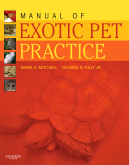|
|
|
| |
 |
|
|

|
 推薦指數:
推薦指數:





|
|
- 內容介紹
|
Manual of Exotic Pet Practice
By Mark Mitchell, DVM, PhD, MS and Thomas N. Tully, Jr., DVM, MS, Diplomate ABVP(Avian), ECAMS
560 pages 400 ills
Trim size 8 1/2 X 10 7/8 in
Copyright 2008
Description
The only book of its kind with in-depth coverage of the most common exotic species presented in practice, this comprehensive guide prepares you to treat invertebrates, fish, amphibians and reptiles, birds, marsupials, North American wildlife, and small mammals such as ferrets, rabbits, and rodents. Organized by species, each chapter features vivid color images that demonstrate the unique anatomic, medical, and surgical features of each species. This essential reference also provides a comprehensive overview of biology, husbandry, preventive medicine, common disease presentations, zoonoses, and much more. Other key topics include common health and nutritional issues as well as restraint techniques, lab values, drug dosages, and special equipment needed to treat exotics.
Key Features
Brings cutting-edge information on all exotic species together in one convenient resource.
Offers essential strategies for preparing your staff to properly handle and treat exotic patients.
Features an entire chapter on equipping your practice to accommodate exotic species, including the necessary equipment for housing, diagnostics, pathology, surgery, and therapeutics.
Provides life-saving information on CPR, drugs, and supportive care for exotic animals in distress.
Discusses wildlife rehabilitation, with valuable information on laws and regulations, establishing licensure, orphan care, and emergency care.
Includes an entire chapter devoted to the emergency management of North American wildlife.
Offers expert guidance on treating exotics for practitioners who may not be experienced in exotic pet care.
Table of Contents
1. History of Exotic Pets
2. Preparing Your Hospital for Exotics
3. Invertebrates
4. Fish
5. Amphibians
6. Crocodilians
7. Snakes
8. Lizards
9. Chelonians
10. Birds
11. Marsupials
12. Mice and rats
13. Ferrets
14. Rabbits
15. Hamsters and gerbils
16. Hedgehogs
17. Guinea Pigs
18. Chinchillas
19. North American Wildlife
|
|
|

